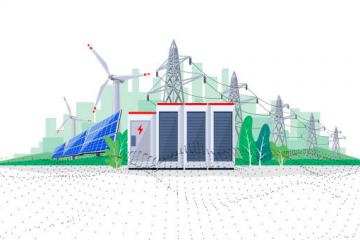India’s smart metering market is experiencing significant growth, driven by government initiatives aimed at modernising the country’s power distribution infrastructure. The increased adoption of smart metering solutions is reshaping the energy landscape, with smart meters and smart grids offering the potential to revolutionise power management. These technologies enable efficient energy usage monitoring, fault detection, quick interventions, and improved grid stability, all of which contribute to a more reliable and sustainable power distribution system.
Government Initiatives Driving Smart Meter Adoption in India
The launch of the Revamped Distribution Sector Scheme (RDSS) by the Ministry of Power in 2022 has accelerated the transition towards smart metering in India. This ambitious initiative is designed to enhance the operational efficiency and financial viability of Distribution Companies (discoms). The RDSS comprises two main components:
- Part A: Provides financial support for prepaid smart metering, system metering, and distribution infrastructure upgrades.
- Part B: Focuses on training, capacity building, and support activities for discoms.
The RDSS has allocated a total of ₹1,349.86 billion for smart metering, with an additional ₹1,191.34 billion for loss reduction. The scheme targets the installation of 250 million prepaid smart meters by 2025, with a total investment of ₹1,500 billion. This initiative aims to modernise India’s energy infrastructure and improve billing accuracy, helping discoms reduce transmission and distribution losses while enhancing revenue collection.
Key Benefits of Smart Metering and Smart Grids
Smart meters and smart grids in India offer a wide range of benefits, including:
- Optimised Asset Utilisation: Maximising the use of existing power infrastructure.
- Reduced Transmission and Distribution Losses: Efficient monitoring and control of energy flow reduce wastage.
- Peak Load Management: Better management of energy consumption during peak hours.
- Improved Grid Visibility: Real-time data enables better decision-making and faster problem resolution.
By deploying advanced metering infrastructure (AMI) at the feeder and transformer levels, the government aims to automate energy measurement and reduce human error. The introduction of prepaid metering is expected to further streamline billing and improve collection efficiency, offering a sustainable solution to discoms’ financial challenges.
Electa’s NODE: Empowering Smart Metering and Grid Management
A key player in this transformation is Electa, a leading provider of innovative solutions for smart metering and smart grid management. One of its flagship products, the NODE, is a cutting-edge data acquisition and control unit designed to enhance the functionality and efficiency of smart grids across India. The Electa NODE integrates seamlessly with Advanced Metering Infrastructure (AMI) and Smart Metering Systems, providing utilities with real-time data and advanced analytics to optimise grid performance.
The NODE offers several key features that make it a valuable asset in India’s smart metering rollout:
- Real-time Data Acquisition: The NODE enables the continuous monitoring of energy consumption, helping utilities track usage patterns, detect faults, and optimise energy distribution.
- Seamless Integration with AMI: As part of Electa’s smart grid ecosystem, the NODE interfaces with smart meters, distribution transformers, and feeder meters to collect and process energy data.
- Scalability: Designed to meet the growing demands of India’s rapidly expanding smart metering infrastructure, the NODE can be scaled easily across multiple locations, ensuring flexibility for utilities.
- Remote Monitoring and Control: The NODE supports remote access and control, allowing grid operators to monitor and manage grid operations efficiently, reducing the need for manual intervention.
With the increasing rollout of smart grids and metering systems across India, the Electa NODE is helping utilities enhance grid reliability, reduce operational costs, and improve customer service.
Smart Metering Progress and Achievements
As of June 2024, the smart metering rollout in India has gained considerable momentum. The total number of sanctioned smart consumer meters has reached 222 million, along with 5.26 million distribution transformer (DT) meters and 0.18 million feeder meters. Notable milestones include:
- 117 million consumer smart meters (53% of the total sanctioned meters) have been awarded.
- 11.6 million smart meters have already been installed, marking a significant step toward the 2025 target.
- 4 million DT meters (77% of the sanctioned meters) and 130,295 feeder meters (71% of the sanctioned meters) have been awarded.
The pace of installations has increased dramatically in 2023-24, with 4.84 million smart meters installed—almost double the previous year’s installations. The Bihar power distribution system leads with 3.24 million installed smart meters, followed by Assam (2.15 million) and Uttar Pradesh (1.19 million). States like Madhya Pradesh and Haryana are also making significant progress in their smart meter deployments.
Smart Grid Pilots and Technological Advancements
In addition to the large-scale rollout of smart meters, several smart grid pilot projects are being implemented across India. These pilot projects are designed to test and validate various advanced technologies, including smart metering, AMI systems, peak load management, distribution transformer monitoring, outage management systems, and rooftop solar integration.
As of May 2024, the Chandigarh Electricity Division has installed 24,214 smart meters, while Jaipur Vidyut Vitran Nigam Limited has installed 145,343 smart meters to serve over 150,000 consumers. These pilot projects are part of the government’s larger plan to enhance grid efficiency and reliability.
These projects also integrate supervisory control and data acquisition (SCADA) systems, which further improve monitoring and control of the distribution network. By leveraging smart metering technology alongside AMI, these pilot projects are paving the way for a more modern, digital power grid in India.
The Future of Smart Metering in India
The rapid adoption of smart metering technologies and the expansion of smart grids in India are critical to achieving a more efficient and sustainable energy future. With the government’s target of replacing all 250 million meters with smart meters by 2025, the market for smart metering solutions in India is poised for exponential growth. Public-private partnerships, technological advancements, and robust policy support will continue to drive the momentum of this transformation.
For the smart metering industry and smart grid solutions, India represents a major opportunity for innovation, investment, and growth, as the country moves towards a smarter, more connected energy future.





